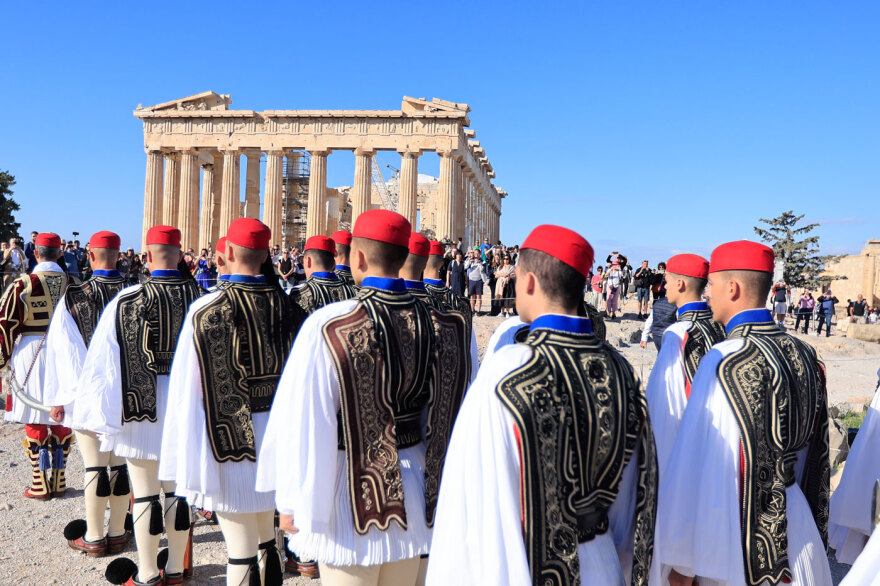81 years since the liberation of Athens on October 12, 1944 – The flag-raising at the Acro
Source: ProtoThema English
On October 12, 1944, one of the most pivotal chapters in modern Greek history came to an end: the withdrawal of the German troops from Athens and the liberation of the city.
The Occupation had lasted more than three years and had left deep scars—human, social, and political.
81 χρόνια από την Απελευθέρωση της Αθήνας και το τέλος της μακράς νύχτας της Γερμανικής Κατοχής.
«Και βλέπομε τη γερμανική σημαία σιγά – σιγά να υποστέλλεται, να εξαφανίζεται σαν να την κατάπιε ο Ιερός Βράχος. Και να αρχίζει να ανεβαίνει στον ιστό το αγαπημένο χρώμα του ουρανού… pic.twitter.com/VEbxOlJ8c2
— Nikos Dendias (@NikosDendias) October 12, 2025
Minister of National Defence Nikos Dendias, in a post on social network X, stated: “Eighty-one years since the Liberation of Athens and the end of the long night of the German Occupation.”
“And we saw the German flag slowly being lowered, disappearing as if swallowed by the Sacred Rock. And the beloved color of our sky began to rise up the flagpole” (Ioanna Tsatsou, Pages of the Occupation), Mr. Dendias added in his post.
The Liberation of Athens refers to the evacuation of the Greek capital by the German troops, an event that took place on October 12, 1944, and is considered the official end of the occupation period. Unlike other countries, however, in Greece, it is not the liberation that is commemorated, but rather the beginning of the war (OXI Day – October 28, 1940), marked by the country’s refusal to surrender. As a result, the date of the Liberation passes relatively unnoticed.



Flag-raising on the Sacred Rock of the Acropolis in the presence of the President of the Hellenic Parliament, Konstantinos Tasoulas

Deputy Minister of the Interior Vassilis Spanakis

Mayor of Athens Haris Doukas

Spanakis: Freedom is not given, it is won
“Freedom is not given! It is won!” stressed Deputy Minister of the Interior, Vassilis Spanakis, representing Prime Minister Kyriakos Mitsotakis at the celebration of the 81st anniversary of the Liberation of Athens from the German occupation forces on the Sacred Rock of the Acropolis.
“The Sacred Rock of the Acropolis, where we stand today, is not merely an archaeological landmark,” Mr. Spanakis noted in his brief address. “It was, is, and will always be a stronghold of democracy and freedom! A beacon of intellect and a global monument of cultural and historical heritage!”
Deputy Minister Spanakis added: “In an era of major geopolitical developments, our country—our Greece—is a pillar of stability, development, peace, and democracy in Europe and the Eastern Mediterranean. Greece now stands globally stronger than ever on all levels—strategic, defense, geopolitical, economic, social, and cultural.”
And he concluded: “We are therefore fighting systematically and with a sense of responsibility for a Greece that moves steadily closer to Europe, for a Greece with economic prospects, political stability, and solid foundations for the future of our children!”
The Day of Liberation
On that day, the people of Athens witnessed the laying of a wreath by the commander of the departing German troops together with the occupation-appointed mayor, Angelos Georgatos, at the Tomb of the Unknown Soldier. When the Germans vacated Syntagma Square, the crowd trampled on the wreath, and hundreds of thousands of people erupted in cheers, celebrating the great moment they had awaited for three and a half long years.
At the building of the Athens Police Headquarters, General Panagiotis Spiliotopoulos appeared—appointed Military Commander of Athens by the government-in-exile in the Middle East—along with some uniformed British officers who had arrived secretly in Athens in the days before. Their presence sparked a wave of enthusiasm among Athenians.
The agreement between the Germans and Greek authorities was silently accepted by both the British and the EAM with the PEEA. On October 8, the KKE (Communist Party of Greece) issued a statement fully accepting the agreed plan, favoring national unity.
81 Years Since the Liberation of Athens on October 12, 1944 – The Flag-Raising at the Acropolis in the Presence of Tasoulas, the Message from Dendias
81 Years Since the Liberation of Athens on October 12, 1944 – The Flag-Raising at the Acropolis in the Presence of Tasoulas, the Message from Dendias
The Withdrawal
At 8:00 a.m. on October 12, General Felmy, accompanied by Athens’ mayor Georgatos, laid a wreath at the Tomb of the Unknown Soldier, while German motorized columns had already begun withdrawing from Athens via the Sacred Way.
At 9:15 a.m., the German garrison at the Acropolis lowered the Nazi flag after a total of 1,624 days of occupation (or 3.5 years, from April 1941 to that day), and a soldier quickly wrapped up the symbol of occupation and departed from the Sacred Rock. Clashes followed between ELAS fighters and Greek workers on one side, and Nazi saboteurs on the other, which prevented the destruction of the electricity plant in Keratsini. However, a large part of the port of Piraeus was blown up by the retreating Germans.
Ask me anything
Explore related questions
The original article: belongs to ProtoThema English .


